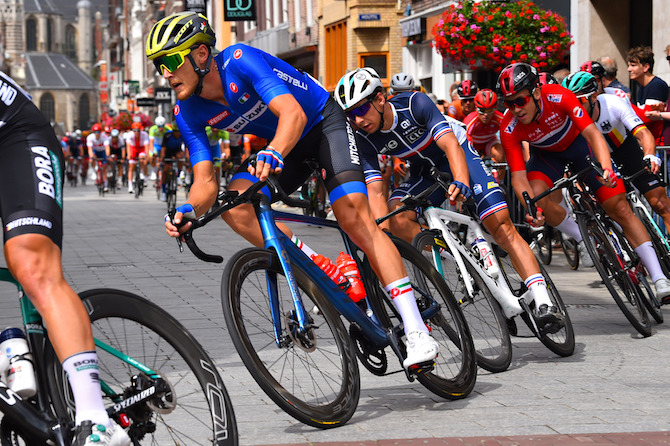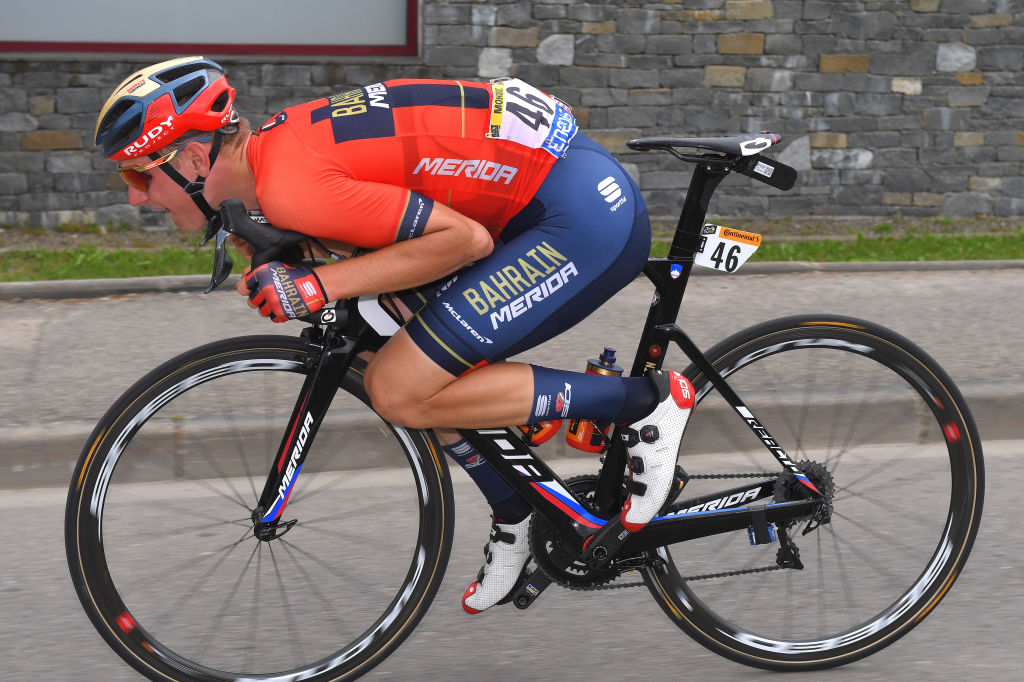Trentin hits back at rider criticism of UCI ‘super-tuck’ ban
‘No one can say they weren’t informed so maybe spend less time on TikTok and be proactive when it comes to making cycling safer’

Matteo Trentin has moved to clarify and reject claims that his fellow professional riders were not informed or involved in the decision-making process that led to controversial ban of both the ‘super-tuck’ and ‘forearms on aero bars’ positions as part of a wide-ranging UCI initiative to improve rider safety at races.
Trentin also called for riders to collaborate and work together.
According to Trentin, who alongside Philippe Gilbert was a rider representative at the series of UCI stakeholders meetings on rider safety this winter, over 800 professional riders were notified back in November and December over the potential changes that were implemented earlier this month. Riders were also given the chance to download the information via Telegram. However, fewer than 20 riders opened the email and downloaded the documents that spelled out possible rule changes.
“No one this time can say that they weren’t informed,” a disappointed Trentin told Cyclingnews.
“I’m sorry to say that they need to check their emails and download the new rules. To tweet that they were not informed is easy but emails were sent to over 800 riders and I can tell you that only 16 riders downloaded the information. If someone wanted to disagree when the proposals were made, they had many chances but there was very little response.
“I’m quite angry about what is now being said. Previously we could have said that the communication wasn’t the best and that riders weren’t informed, but this time that’s not the case. This time it was all clear.
“I don’t know who they want to blame but it can’t be me, Phil (Gilbert) or the CPA. Not this time. Maybe riders should spend less time on TikTok and be more proactive when it comes to making their workplace a safer place.”
The latest race content, interviews, features, reviews and expert buying guides, direct to your inbox!
While the banning of the ‘super-tuck’ and aero positions generated the most headlines and controversy, the UCI pushed through a series of new regulations that also included the disposal of rubbish in races, new standardization of race barriers that will come into place in 2021, an interim solution until that date, new rules for barriers in 2022, the appointment of safety officers at races and several other new rules, all with the aim of improving rider and race safety.
The drive for the improvements came after the horrendous crash at the Tour de Pologne that left Fabio Jakobsen fighting for his life in hospital.
Social media has been awash with arguments over tucks and forearm positions and criticism of the UCI. However Trentin, who has over a decade of WorldTour experience and gives up his free time only to hear some of his fellow riders criticize his efforts, called on the sport and the critics to look at the bigger picture surrounding the changes.
“People need to look at things from a bigger perspective,” the Italian told Cyclingnews.
“These were one or two rules that were part of a much bigger package and I don’t know why these two aspects are presented in the way they have been. It looks as though only two changes were passed but that wasn’t the case.
“Everyone can either agree or disagree and I don’t see that there’s a big problem. I think that some riders will think that the rules are stricter for them than some others within the sport but if they took the time to look at the regulations then they would see that there are plans laid out for the next few years, including the new design of barriers. There are also rules on how vehicles should pass the peloton, and many other things.
“Everyone just needs to look at the bigger picture. I have nothing against you if you disagree with the rules on the super tuck position but these rules are coming in so that the sport is made safer.”
“We’re starting from zero, in many ways,” Trentin added.
“If you look at ice skating for example, they have a huge book on safety rules and we had nothing like that to start with. Starting at zero is always difficult.”

New framework and regulations will create a base for further improvements
The ‘super-tuck’ position has come to prominence in recent years thanks to its distinctive look and the fact that high profile riders have been among those to use it on the biggest stages.
There is no direct evidence to suggest that it increases the risk of crashing but Trentin has noticed a dangerous trend in the peloton. His argument is that the UCI and the CPA should be applauded for being proactive, rather than waiting for a major accident and then deciding on new regulations.
“I was in the general meeting when this tuck position came up. I can tell you that personally for me it’s not that dangerous if it’s done properly but the problem is that now riders in the bunch, in the middle of the bunch, are doing it and that’s not safe at all,” he pointed out.
“You can see more and more riders doing it when they’re just sat in the wheels. We as riders brought this up and then the topic came up in the next meeting and that lead to the ban.
“I’ve had lots of calls from coaches telling me that they work with young kids who do this more and more because of our example. We’re talking about under-15 riders and they’re copying us. Instead, I’d like to see us teach these kids how to descend safely and ban the tuck for them first and then phase it upwards towards the pros. The problem with just banning it from the front of the race or when a rider is alone is that it’s impossible to patrol. We don’t have drones looking at who is doing it in 25th position. And that’s why the ban is coming in.”
Despite the frustration, Trentin truly believes that while the situation isn’t perfect, the new framework and regulations will create a base for further improvements surrounding rider safety.
When asked if some of the criticism could be simply down to the fact that a number of riders don’t feel that the CPA truly represents them, Trentin said: “It’s possible but I don’t think it’s true this time. They just had to open their emails or talk to anyone who was involved in the process.”
The emergence of the Rider Union, a separate and potentially competing agency to the CPA, could alter the fragile harmony, but Trentin wants to see greater cooperation between all of the organisations and that collaboration is one of the most important aspects.
“I think the most important thing is that there’s not a fight between two competing systems. Maybe there’s a collaboration to work for the riders in the best way possible. If there’s two different entities and they both sit at the table and have a say that’s also good. If someone doesn’t feel represented by the CPA but does by the new union, that’s fine.
“If someone wanted to disagree then all they needed to do was scroll down to page 24 of the proposals and then get back to us. It’s frustrating for me because I’m giving up my own time to make our sport a bit safer. I think that all the times riders need to be attentive, so if something comes in and it doesn’t work then we need to stand up and say so. We can only do that together.”
Daniel Benson was the Editor in Chief at Cyclingnews.com between 2008 and 2022. Based in the UK, he joined the Cyclingnews team in 2008 as the site's first UK-based Managing Editor. In that time, he reported on over a dozen editions of the Tour de France, several World Championships, the Tour Down Under, Spring Classics, and the London 2012 Olympic Games. With the help of the excellent editorial team, he ran the coverage on Cyclingnews and has interviewed leading figures in the sport including UCI Presidents and Tour de France winners.

